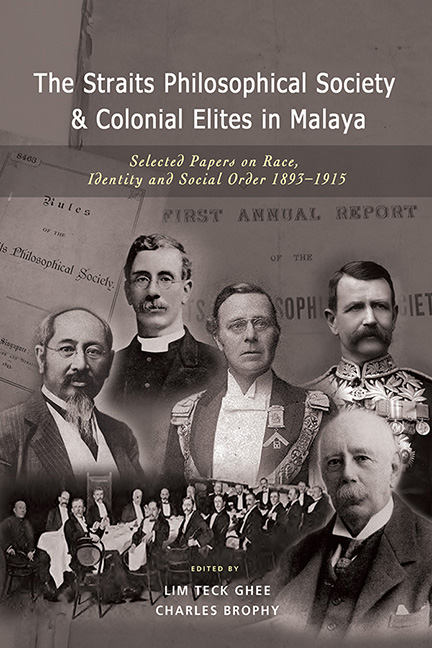 The Straits Philosophical Society and Colonial Elites in Malaya
The Straits Philosophical Society and Colonial Elites in Malaya Published online by Cambridge University Press: 09 January 2024
Editors’ Note
“The Chinese in British Malaya” is one of Lim Boon Keng’s clearest and most detailed writings on the history and position of the Chinese in British Malaya. The first half is devoted to documenting the migration of the Chinese to Malaya and describing the different dialect groups and their economic activity in the colony. Yet, more than a straightforward historical essay, the presentation sought to analyse and reflect upon the effects of life in Malaya upon the Chinese in a way which highlights Lim’s concerns around race, social Darwinism and nationalism. One significant factor that he identified was the effect of mixing Malay with Chinese blood; and his belief that life in the tropics was tending towards the degeneration of the resident Chinese race and was producing inferior offspring who “despise labour”. This, Lim argued, was mitigated by “Chinese blood from China” which continued to arrive in Malaya to check “the degenerative process”. The education of girls was also seen to delay “degeneration”, yet “unless young people are removed from the tropics, there seems very little hope of maintaining the stamina and the virile qualities of the race—attributes due principally to the Chinese environment”.
For Lim what was partly to blame was the system of education in the Straits which, unlike the system employed by the Dutch, he saw as deleterious to the handing down of trading instincts and other aspects of Chinese culture. He also rejected the idea of “Europeanization” which he argued was “unattainable and undesirable”. To halt this degenerative process, he advocated a return to the teaching of Chinese morality and an education system mixing manual labour with an academic curriculum. Such an approach in his view could lead to a positive re-sinicization emerging out of the climatic and social conditions of the Malay Peninsula.
At the same time, Lim’s concerns around race and social Darwinism led him to also address the position of the Malays in the colony in a manner which reflected the European thought of the Society’s members.
To save this book to your Kindle, first ensure [email protected] is added to your Approved Personal Document E-mail List under your Personal Document Settings on the Manage Your Content and Devices page of your Amazon account. Then enter the ‘name’ part of your Kindle email address below. Find out more about saving to your Kindle.
Note you can select to save to either the @free.kindle.com or @kindle.com variations. ‘@free.kindle.com’ emails are free but can only be saved to your device when it is connected to wi-fi. ‘@kindle.com’ emails can be delivered even when you are not connected to wi-fi, but note that service fees apply.
Find out more about the Kindle Personal Document Service.
To save content items to your account, please confirm that you agree to abide by our usage policies. If this is the first time you use this feature, you will be asked to authorise Cambridge Core to connect with your account. Find out more about saving content to Dropbox.
To save content items to your account, please confirm that you agree to abide by our usage policies. If this is the first time you use this feature, you will be asked to authorise Cambridge Core to connect with your account. Find out more about saving content to Google Drive.